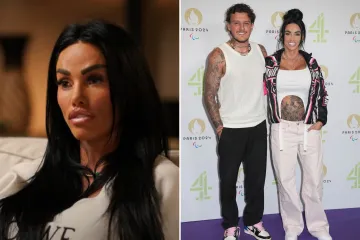Katie Price’s ex JJ Slater reveals post break-up weight loss as he sheds pounds in ten days after split
JJ SLATER has been hitting the gym after splitting from Katie Price, and revealed he’s already been shedding the pounds.
The former flames first started dating at the end of 2023 but recently called it quits.
But it appears JJ is taking care of himself and focusing on his physical health, taking to Instagram today to praise his coach.
In a candid video sat in his car post-workout, an exhausted JJ shared: “About ten days ago I put up [posted] that I’ve been working with Kieran from Konditioning Coaching.
“He’s an online coach. I’ve never had one before but I thought that I’d give it a go.
“We’re 10 days in, and I’m 2.8kg down which is obviously a blinder.
“Yeah he holds me accountable, he sorts out my nutrition, sorts out my workouts, makes sure I’m doing my steps, my cardio.
“And if I’m not doing it he’ll call me up and be like J what are you doing.”
JJ wrapped the message off by saying he’s glad he could take his followers along with him for the journey.
“If you’re not sure about getting an online coach maybe seeing my journey might help you decide on that but yeah, shout out Kieran and more to come on this.”
JJ also tagged Kieran and described him in a message penned over the video as the “brains behind the operation.”
In the run up to Katie and JJ splitting, there has been plenty of speculation that things weren’t smooth sailing.
And now Katie has opened up about the complicated issues their relationship faced over the years.
In a new YouTube vlog, the reality star said she is looking ahead to a positive 2026, but experienced ups and downs last year.
Speaking about her struggles with things going on behind closed door, Katie shared: ” 2025 privately there’s been some hiccups.
“Work wise it’s been fantastic – I’ve done my tour, I’ve done my music, I’ve moved to a beautiful house.
“Everything is good, of course everyone in life will have ups and downs – and I wouldn’t want everything to be perfect.
“But this is my year – this is my year, I am telling you.”
Since the split Katie has also been sharing quotes on Instagram about soulmates and “real intimacy”.


